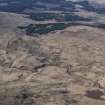Woodhead
Lead Mine (Period Unassigned), Lead Smelter (19th Century)
Site Name Woodhead
Classification Lead Mine (Period Unassigned), Lead Smelter (19th Century)
Canmore ID 106171
Site Number NX59SW 1.01
NGR NX 531 936
Datum OSGB36 - NGR
Permalink http://canmore.org.uk/site/106171
- Council Dumfries And Galloway
- Parish Carsphairn
- Former Region Dumfries And Galloway
- Former District Stewartry
- Former County Kirkcudbrightshire
NX59SW 1.01 534 937
Components of the smelting area include (numbers 1 -9 relate to annotated OS 1:10000 extract in MS/744/73):
1. A much reduced, rubble built square section chimney (NX 5340 9377).
2. A reduced, rubble built, square section chimney (NX 5338 9373).
The base of the flues are some 40m above the smelters.
3. A double row of underground, rectangular section, possibly tapered, flues to chimney at NX 5340 9377.
4. A double row of underground, rectangular section, possibly tapered, flues to chimney at NX 5338 9373.
5. The remains of a brick-lined flue, 2 rows which connnects to 'Y' junctions N of the track (NX 533 935).
6. The remains of a smelter (NX 533 935). This is depicted as roofed and annotated as 'Smelting Houses' on the 1st edition of the OS 6-inch map (Kircudbrightshire 1850, sheet V and IV).
7. The remains of a square section chimney, rubble built and possible boiler house (NX 534 935).
8. The remains of a smelter (NX 533 935). This is depicted as roofed and annotated as 'Smelting Houses' on the 1st edition of the OS 6-inch map (Kircudbrightshire 1850, sheet V and IV).
9. A single storey and attic dwelling with dormer windows, slate roof and is rubble built. The outbuilding is single storey with a slate roof and is rubble built.
Visited by RCAHMS (GJD) 30 July 1990.
Standing Building Recording (13 July 2022 - 25 August 2023)
NX 52964 93598 A building survey was undertaken at Woodhead Lead Mine, Carsphairn. The works were carried out by volunteers supported by Rathmell Archaeology staff. The mine at Woodhead was a rare example of a total production unit in Scotland – one which mined, crushed, washed and smelted the lead before it was exported – but it was also a village: the landowner who established the mine built housing, a school and even founded a library for the workers so that they could form their own community in this remote setting. The building survey aimed to generate a record of the historic fabric of the structures before they deteriorate any further and comprised a photographic record, a written record, and sketched plans and elevations of the existing structures. Focusing on the buildings at the western end of the mining complex, seven structures were recorded, which included the manager’s house and office, two rows of miners’ cottages, stables, a powder magazine and a school. The structures vary in their state of survival; while none remain roofed, the height of the standing walls range from one or two courses up to full height. Over 300 photographs were generated from the survey, capturing information on fabric, current condition and varying phases of modification and use.
Information from C. Williamson - Rathmell Archaeology Ltd, 2023.
OASIS ID: rathmell1-437549








